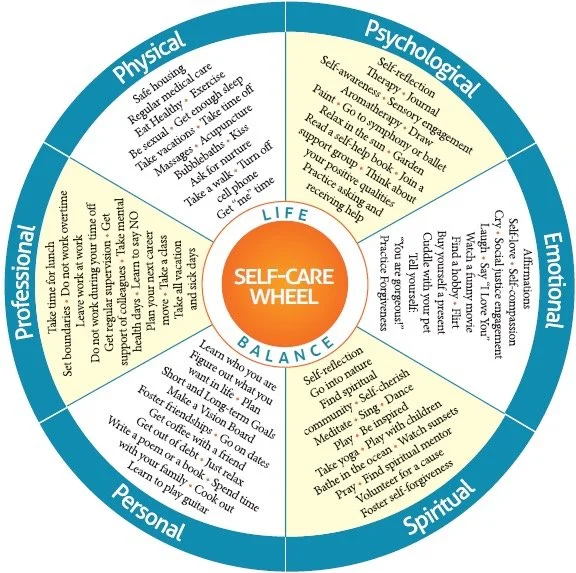The Self-Care Wheel and How It Can Help You

Author: Dr. Mary Perleoni, Ph.D., LMHC
Published Jan 17, 2025
Life can sometimes feel like a whirlwind between work, family, and the many other responsibilities each of us have. It can be easy at times to forget to prioritize taking care of ourselves, but self-care is more than just a buzzword. It’s essential for our mental health, happiness, and well-being. That’s where the Self-Care Wheel comes in. The Wheel is a simple and powerful tool to help you create balance and prioritize your needs.
Tampa Therapist Explains: What Is the Self-Care Wheel?
The Self-Care Wheel is a visual guide that breaks down self-care into six essential areas which include the physical, psychological, emotional, spiritual, personal, and professional. It’s designed to help you evaluate your well-being and take actionable steps toward living a more fulfilling life.
If you’re looking for therapy in Tampa or searching for a “therapist near me” to help with stress, anxiety disorders, or just finding balance, we invite you to schedule a free consultation with our team.
What is Self-Care?
Self-care is an essential aspect of maintaining your mental health. It involves taking intentional steps to care for one’s own physical and emotional well being. Self-care shouldn't be viewed as a luxury, but rather a necessity, especially for individuals dealing with mental health challenges. If this is something you have struggled with, a licensed mental health counselor or therapist can help develop a self-care plan specific to your needs.
It’s important to remember that there isn’t a one-size-fits-all approach to self-care. It requires a deep understanding of one’s values, goals, and needs. By prioritizing self-care, individuals can improve their mental state, increase their resilience, and enhance their overall experience of life.
Breaking Down the Six Areas of Self-Care
Physical Self-Care
Physical self-care means taking care of your body. It’s about staying active, eating well, and getting enough sleep. In Tampa, it could look like walking along Bayshore Boulevard, a yoga class at Bella Prana, or enjoying a massage.
Psychological Self-Care
This can include things like journaling, practicing mindfulness, or talking to a therapist. At It Begins Within Counseling, we specialize in Tampa therapy services to help you manage anxiety and other mental health concerns.
Emotional Self-Care
Emotional self-care focuses on your feelings such as practicing self-compassion and expressing your creativity. For many of our Tampa clients, therapy is a safe space to process emotions and build emotional resilience.
Spiritual Self-Care
Spiritual self-care isn’t just about religion, it’s about finding meaning and connection. Whether it’s meditating, connecting with nature, or practicing your faith.
Personal Self-Care
Reconnecting with your passions and goals is key to personal self-care. Maybe it’s setting new career goals, exploring a new creative hobby, or just taking time for yourself at a café. It's about doing anything that brings you joy.
Professional Self-Care
Even your work life needs boundaries. Taking breaks, leaving work on time to make the family gathering, and learning to use “no” all can be means of practicing professional self care. For many Tampa professionals, therapy can help with managing stress and achieving a healthier work-life balance or integration.
Self-Care Activities
The Self-Care Wheel shown above is a useful tool for identifying areas where individuals need to focus their self-care efforts. Here are some self-care activities for each area:
Physical - Engage in regular exercise, eat a balanced diet, get enough sleep, and practice stress-reducing techniques such as yoga or meditation.
Psychological - Practice self-awareness, engage in activities that promote relaxation, practice gratitude, and challenge negative thoughts.
Emotional - Allow yourself to feel and express emotions, engage in creative activities, and practice self-compassion.
Spiritual - Practice mindfulness, engage in activities that promote a sense of connection to something larger than oneself, and cultivate a sense of gratitude.
Personal - Engage in activities that promote learning and personal growth, practice self-awareness, and cultivate a sense of purpose.
Professional - Set boundaries, take regular breaks, and engage in activities that promote professional development and work-life balance.
Why Use the Self-Care Wheel?
The Self-Care Wheel isn’t just a concept, it’s a practical tool. It can help you:
Identify areas in your life that need more attention
Develop a personalized self-care routine
Improve your physical, emotional, and mental health
Build stronger relationships and better communication skills
Become more resilient and better equipped to handle stress
Creating a Self-Care Plan
Creating a self-care plan involves identifying areas where individuals need to focus their self-care efforts and developing strategies for addressing those areas. Here are some steps for creating a self-care plan:
Identify areas where you need to focus your self-care efforts: Use the Self-Care Wheel to pinpoint which domains need more attention.
Develop strategies for addressing those areas: Work with a trusted friend or licensed therapist to create actionable steps tailored to your needs.
Prioritize your self-care activities: Determine which activities are most important and make them a priority.
Schedule time for self-care activities: Set aside specific times in your schedule for self-care to ensure it becomes a regular part of your routine.
Review and revise your self-care plan regularly: Periodically assess your self-care plan and make adjustments as needed to ensure it continues to meet your needs.
Implementing Self-Care in Daily Life
Implementing self-care in daily life requires commitment and intentionality. Here are some tips for incorporating it into your daily routine:
Start small: Begin with small, manageable self-care activities and gradually increase the intensity and duration.
Prioritize self-care: Make self-care a priority by scheduling time for self-care activities.
Be consistent: Consistency is key when it comes to self-care. Try to engage in self-care activities at the same time every day.
Seek support: Seek support from friends, family, or a mental health professional if you need help implementing self-care in your daily life.
How We Incorporate the Self-Care Wheel in Tampa Therapy Sessions
At It Begins Within, when applicable we use the Self-Care Wheel to guide clients in creating a self-care plan that fits their life. Whether you’re working through anxiety, navigating a major life change, or just feeling burned out, we’ll help you address each area of self-care. Techniques like mindfulness and Prolonged Exposure Therapy are integrated into sessions to help you feel more balanced and in control. These therapy sessions are crucial for effectively addressing conditions such as PTSD and anxiety disorders.
Overcoming Barriers to Self-Care and Mental Health Challenges
We get it, self-care isn’t always easy. Maybe you feel like you don’t have time, or you’re worried about seeming selfish. Sometimes, mental health challenges like anxiety or depression make it harder to prioritize yourself. Conditions like anxiety disorders and depression can significantly impact one's ability to focus on self-care.
The key is recognizing these barriers and working through them.
Your well-being starts with one small step. Let’s take it together.



